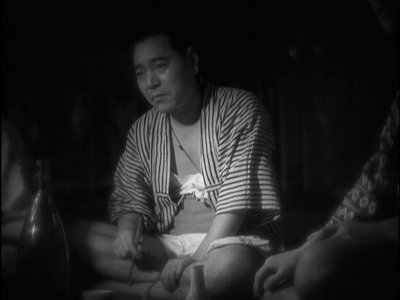
A Story of Floating Weeds (1934 movie)

For more foreign movies, check out Caroline’s World Cinema Series 2012 and Richard’s monthly Foreign Film Festival round-up.
The IMDb.com page for this movie can be found here.
I usually enjoy the Sunday night movies on TCM—they’re one of the few things I record. This one was on a few weeks ago and I finally had a chance to watch it. Japanese director Yasujirô Ozu made this silent film with the intent to explore the “dissolution of the Japanese family” (as introduced by Robert Osborne).
I’ll provide the usual note on spoilers included below, although it’s nothing that mars watching the film.
The film begins with an acting troupe arriving in a rural town. While in town, the leader of the troupe (Kihachi) visits his former lover and their 19-year-old son. The son believes his father was a civil servant, now dead, and calls Kihachi ‘uncle.’ Kihachi’s current mistress, an actress in his troupe, finds out about the son and jealously sets out for revenge.
There are hints of jealousy (in general) early on—a barber’s wife comments on Kihachi’s handsome nature when he was young, distracting the barber so that he cuts the customer he was shaving. While central to the movie, the jealousy theme and the actresses’ revenge proves to be a small part of the story Ozu explores. The “dissolution” theme was the more interesting part for me. Some of the examples are minor, such as an actor stealing money from his son’s kitty-bank when the troupe’s shows are put on hold due to rain. The core of this theme, though, focuses on Kihachi and his son. While in town Kihachi spends time with his son and he realizes what he has given up by not having a father/son relationship over the years. In their time spent together he also realizes his son has advanced beyond him in many ways. The scorn the son shows his father once his relationship is revealed matches Kihachi’s pain as he pleads for understanding. Kihachi wanted a better life for his son and he felt the best way to do that was to lie and live in loneliness. His life has been like the floating weeds he sees while fishing with his son (duckweed, a common symbol in Japanese poetry), aimless and without meaning.
In foreign films, the language can be translated but I always have a nagging feeling cultural items don’t always make the translation. One example in this film surfaces during one of its jokes. A father sees his son eating watermelon and tells him “Don’t wet the bed again or you’ll get a moxa tratment.” The child looks down and covers his crotch in terror. A few seconds later the child looks over and sees Kihachi receiving a moxa treatment on his back and asks “Did the boss wet the bed last night?” After noting Kihachi usually trying to cool off with a damp handkerchief over his head and always scratching, I asked my wife (an acupuncturist) what such issues mean in Traditional Chinese Medicine. Going on this very general description, she said it indicated he was probably in the early stages of an illness. I don’t think this was accidental, even if Ozu meant it metaphorically instead of literally.
Even with probable gaps in understanding, I enjoyed the film and recommend it—thoroughly enjoyable.
Note: Ozu remade the film in 1959, titling it Floating Weeds. I have not seen it (even though it came on TCM directly after this movie), but wanted to note this to avoid confusion.

Caroline
I know from French/Italian and German movies that the translations are often lacking often. It's much worse than for books and I've seen French classics completely distorted by lousy subtitles. In the case of French cinema it's not surprsing, the movie are often heavy on dialogue. From my Japanese movie phase however I know that the dialogue isn't the most important but jokes do not translate so well.
How interesting that he chose to remake his own movie. That's pretty unusual.
I'll keep this one in mind. I still have a few of Kurosawa's movies that I haven't seen and would like to watch those first.
Dwight
Ozu was a noted perfectionist, so I guess it isn't too strange he revisited his own movie (but definitely out of the ordinary). The remake is supposed to be very good, too.
Language is difficult enough to translate, but I found this example a good reminder that there are other things that may have to be translated as well.
I think my next one to write about will be Larks on a String directed by Jiří Menzel. I'm really beginning to like Second Run DVD's offerings.
Richard
I haven't seen any of Ozu's works yet, but I've heard so many good things abou them. The father/son relationship sounds like a strength to me, and it might be interesting to see how another culture treats that topic. Thanks for posting on this.
Dwight
I definitely want to check out more of Ozu's works based on this.